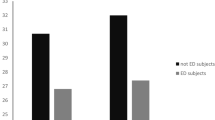Background: Prader-Willi Syndrome (PrWS) is an uncommon neuroendocrine disorder of genetic origin, described in 1956 by Prader, Labhart and Willi. The main clinical manifestations in the adult are mental retardation, hyperphagia with gross obesity, hypogonadismcriptorhismus and short stature. The life expectancy of the affected individual ranges between 20 and 30 years - rarely beyond - due to complications related to excessive obesity. Sustained dieting combined with behavior modification programs, as well as gastric restrictive surgery for obesity, proved to have a high failure rate in PrWS, due to the patients' inability to cooperate in changing their eating habits. Methods: Billiopancreatic Diversion (BPD), which does not require the patient's cooperation in changing eating habits after surgery, was performed in two PrWS patients (13- and 22-years-old), both with excessive obesity, severe respiratory distress, day sleepiness and limited mobility. Results: Two years after surgery, the 13-year-old had lost 80% of her overweight, while the 22-year-old, after 1 year, had lost 34%. Recent laboratory tests showed normal data in both patients. Their respiratory distress had subsided completely, their mobility improved dramatically, and their self-image and alertness enhanced. Conclusion: BPD resulted in an improved quality of life in these patients.
Similar content being viewed by others
Author information
Authors and Affiliations
Rights and permissions
About this article
Cite this article
Antal, S.C., Levin, H. Biliopancreatic Diversion in Prader-Willi Syndrome Associated with Obesity. OBES SURG 6, 58–62 (1996). https://doi.org/10.1381/096089296765557286
Published:
Issue Date:
DOI: https://doi.org/10.1381/096089296765557286




